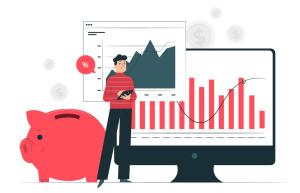Consumerism, the constant pursuit of acquiring goods and services, plays a pivotal role in shaping modern societies. While it brings about numerous benefits, it is not without its challenges. In this article, we will delve into the importance and benefits of consumerism, explore its positive and negative aspects, address the problems associated with it, and discuss potential solutions.
The Importance and Benefits of Consumerism: Consumerism serves as a catalyst for economic growth, driving industries and creating job opportunities. It fosters innovation and competition, pushing businesses to improve products and services to meet consumer demands. Additionally, consumer spending stimulates the economy by increasing demand for goods and services, leading to a multiplier effect on overall economic activity.
Positive Aspects of Consumerism:
- Innovation and Technological Advancements: Consumer demand drives companies to innovate, resulting in the development of new technologies and products that enhance our lives.
- Job Creation: The constant need for production and distribution of goods and services creates employment opportunities, contributing to a stable and growing job market.
- Improved Standards of Living: Consumerism has historically played a role in raising living standards, providing individuals with access to a wider range of products and services.
The Dark Side of Consumerism:
- Environmental Impact: The excessive production and disposal of goods contribute to environmental degradation, including pollution, deforestation, and climate change.
- Debt and Financial Strain: Overconsumption can lead to personal debt and financial instability as individuals may prioritize immediate gratification over long-term financial well-being.
- Social Inequality: Consumerism can exacerbate social inequalities, as access to the latest products and services may be limited to those with higher incomes.
The Problems of Consumerism:
- Disposable Culture: Fast-paced consumerism promotes a throwaway culture, contributing to excessive waste and resource depletion.
- Overemphasis on Materialism: A focus on material possessions can lead to a superficial and unfulfilling pursuit of happiness, neglecting the importance of experiences and relationships.
- Global Supply Chain Exploitation: The demand for cheap goods can lead to unethical labor practices and exploitation in the global supply chain.
The Cons of Consumerism:
- Stress and Mental Health Issues: The constant pressure to keep up with consumer trends and societal expectations can lead to stress, anxiety, and mental health issues.
- Loss of Cultural Identity: Homogenization of consumer culture may erode unique cultural identities as globalized trends take precedence.
Solutions to Mitigate the Negative Impact of Consumerism:
- Sustainable Practices: Encouraging and adopting sustainable production and consumption practices can help minimize environmental impact.
- Financial Education: Promoting financial literacy can empower individuals to make informed and responsible consumption choices, reducing the risk of debt.
- Support for Ethical Businesses: Choosing to support businesses that prioritize ethical and sustainable practices encourages responsible consumer behavior.
Conclusion:
Consumerism, with its dual nature of benefits and drawbacks, is an integral part of contemporary society. Striking a balance between responsible consumption and environmental, social, and personal well-being is key to navigating the complexities of consumerism. By fostering awareness and embracing sustainable practices, we can shape a future where consumerism aligns with the values of a thriving, equitable, and environmentally conscious society.






